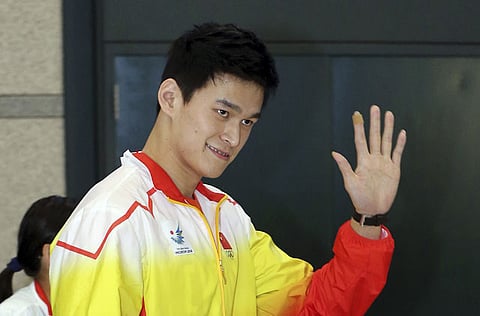Sun Yang lawyer blasts ‘lies’ after eight-year drug ban
Three-time Olympic champion swimmer Sun Yang comes out swinging

Hong Kong: Three-time Olympic champion swimmer Sun Yang came out swinging on Saturday against his eight-year drugs ban, threatening legal action of his own as he attempts to salvage his broken career.
The Court of Arbitration for Sport (CAS) hit the Chinese freestyler with the lengthy ban on Friday for refusing to give a doping sample in September 2018.
It is the 28-year-old’s second ban for doping, having served three months in 2014, and he said in the immediate aftermath that he would appeal at the Swiss federal court.
A lawyer for Sun, a hugely popular figure in China, issued a fiery statement on Saturday reiterating that he will appeal, based on “a series of procedural errors”.
“February 28, 2020 was a dark day. It shows the scene where evil defeats justice and power replaces self-evident truths,” Beijing lawyer Zhang Qihuai said in a statement.
“On this day, CAS listened to prejudice, turned a blind eye to rules and procedures, turned a blind eye to facts and evidence, and accepted all lies and false evidence.”
The statement reasserted Sun’s defence that doping officials who came to his home were not qualified or authorised, and it was they who decided not to pursue testing.
Sun will sue a doping inspector who gave “false evidence”, said the lawyer, also accusing the World Anti-Doping Agency (WADA) of “distorting facts and abuse of power”.
‘Nothing personal’
With the Tokyo Olympics just five months away, the reigning 1500m freestyle world record-holder is fighting to save his career and reputation.
A vial of Sun’s blood was smashed with a hammer during the contentious testing session in 2018, but he was acquitted by world swimming body FINA of anti-doping violations, agreeing that testers failed to produce adequate identification.
But WADA took the matter to CAS, demanding a ban of between two and eight years for missing the out-of-competition test.
In its bombshell judgement, CAS said its panel “unanimously determined” that Sun, whose career has been overshadowed by numerous controversies, had tampered with his doping control.
The severity of the ban reflected the fact that it was his second doping violation. He served three months in 2014 for taking a banned substance.
Sun’s downfall will be celebrated by clean athletes, but his arch-critic and rival Mack Horton said their bitter feud was never personal.
The Australian refused to shake hands with Sun after a medal ceremony at last year’s acrimonious world championships in South Korea, after which Horton received death threats on social media.
It reignited a row from the 2016 Rio Olympics, where Horton labelled Sun a “drug cheat”.
“I think regardless of the outcome it was always going to be a statement to the world and my stance has always been about clean sport, never about nations or individuals,” Horton told Channel Seven en route to training on Saturday.
David Sharpe, who heads the Australian Sports Anti-Doping Authority, said the CAS ruling “restores faith in the anti-doping system”.
Australian media revelled in Sun’s demise with the Sydney Morning Herald saying: “Career-ending ban vindicates Horton’s contempt for star.”
“His legacy will always be linked to that of Sun, a now semi-tragic figure who will be revered as a sporting martyr in China regardless of the CAS ruling,” it added.
Sign up for the Daily Briefing
Get the latest news and updates straight to your inbox






